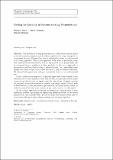Coding for locality in reconstructing permutations
Author(s)
Raviv, Netanel; Yaakobi, Eitan; Medard, Muriel
Download10623_2017_378_ReferencePDF.pdf (409.5Kb)
OPEN_ACCESS_POLICY
Open Access Policy
Creative Commons Attribution-Noncommercial-Share Alike
Terms of use
Metadata
Show full item recordAbstract
The problem of storing permutations in a distributed manner arises in several common scenarios, such as efficient updates of a large, encrypted, or compressed data set. This problem may be addressed in either a combinatorial or a coding approach. The former approach boils down to presenting large sets of permutations with locality, that is, any symbol of the permutation can be computed from a small set of other symbols. In the latter approach, a permutation may be coded in order to achieve locality. Both approaches must present low query complexity to allow the user to find an element efficiently. We discuss both approaches, and give a particular focus to the combinatorial one. In the combinatorial approach, we provide upper and lower bounds for the maximal size of a set of permutations with locality, and provide several simple constructions which attain the upper bound. In cases where the upper bound is not attained, we provide alternative constructions using a variety of tools, such as Reed-Solomon codes, permutation polynomials, and multi-permutations. In addition, several low-rate constructions of particular interest are discussed. In the coding approach we discuss an alternative representation of permutations, present a paradigm for supporting arbitrary powers of the stored permutation, and conclude with a proof of concept that permutations may be stored more efficiently than ordinary strings over the same alphabet.
Date issued
2017-07Department
Massachusetts Institute of Technology. Department of Electrical Engineering and Computer Science; Massachusetts Institute of Technology. Research Laboratory of ElectronicsJournal
Designs, Codes and Cryptography
Publisher
Springer US
Citation
Raviv, Netanel, et al. “Coding for Locality in Reconstructing Permutations.” Designs, Codes and Cryptography, vol. 86, no. 2, Feb. 2018, pp. 387–418.
Version: Author's final manuscript
ISSN
0925-1022
1573-7586